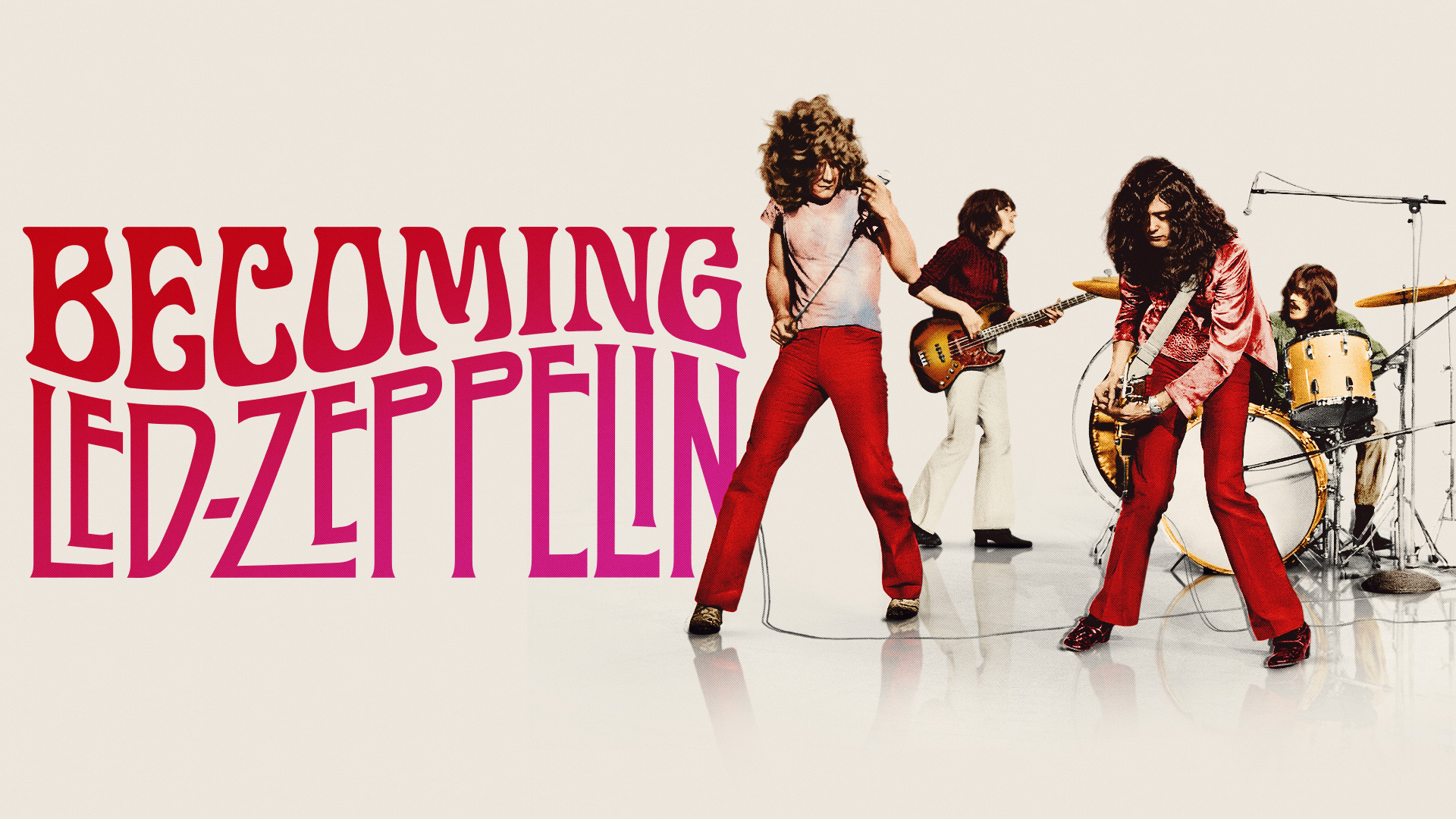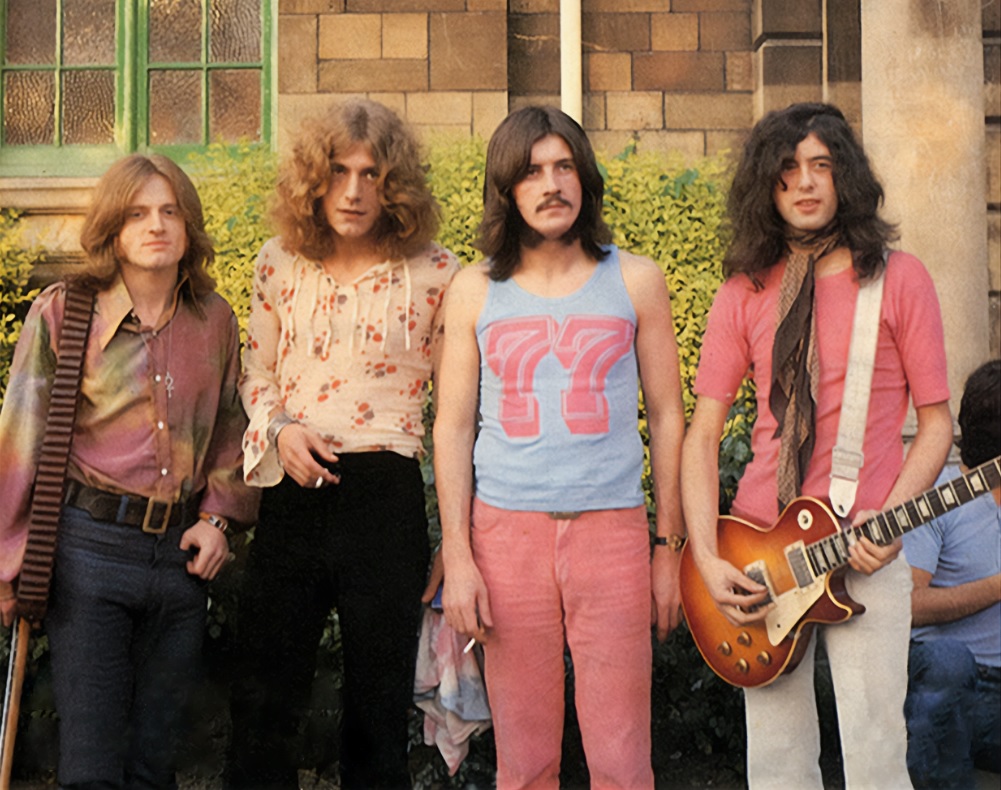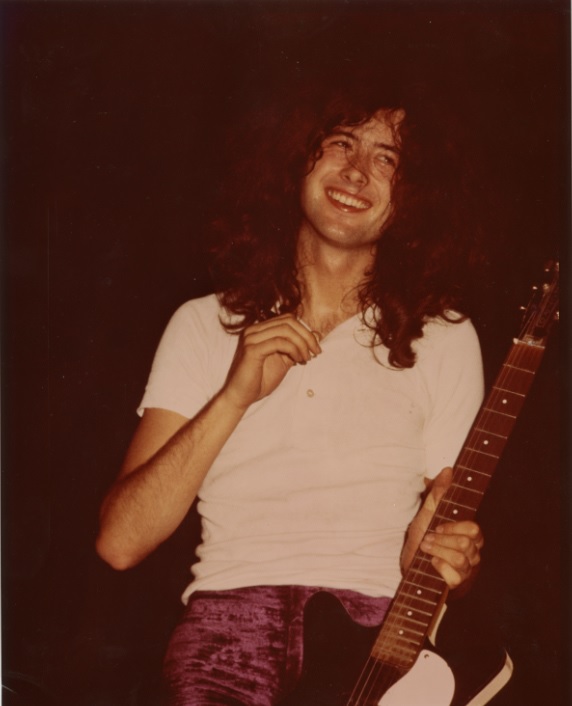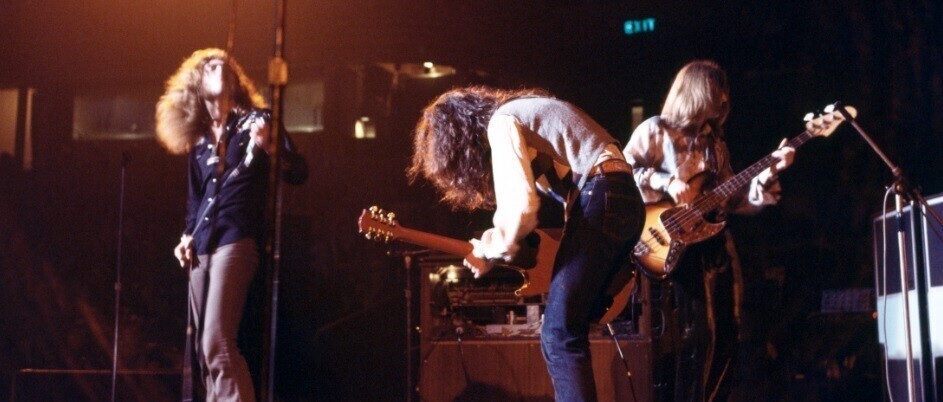I had the good fortune to catch Becoming Led Zeppelin the other night in Manhattan. Even better, I experienced this motion picture in IMAX.
What a cornucopia for the eyes and ears!
This top-drawer film is the first official, authorized documentary ever produced with the full cooperation of the surviving members of this rock & roll supergroup.
Through extensive, recent conversations with the filmmakers, bassist John Paul Jones, guitarist Jimmy Page, and vocalist Robert Plant reflect on their individual and shared musical journeys — from the rubble and rationing of post-World War II Great Britain to early exposure in America, and on to massive international fame and fortune. Drummer John Bonham passed away in September 1980. Nonetheless, he speaks via a heretofore-unheard interview.

Becoming Led Zeppelin promotional poster
This film relies extensively on long-forgotten or previously unreleased sights and sounds. This includes rehearsal and concert footage, TV clips, press-release headlines, and — as director Bernard MacMahon revealed at a post-screening Q&A session — “plastic bags full of photographs” and other materials that these musicians furnished. (MacMahon told me that these artifacts are now digitized and eventually will become publicly accessible.) Page’s calendars and diaries provide fascinating details on everything from tour personnel to recording-session start times, often after 11:00 p.m., following live concerts.
Well before any of this transpired, we see these young men pick up their instruments as kids. They learned to play in grade-school ensembles, at church, and in adolescent pick-up bands — generally with the support and encouragement of their parents. James Brown, Little Richard, Muddy Waters, Howlin’ Wolf, Sonny Boy Williamson, and a host of American blues and soul artists were among their chief influences. Initial success in the Yardbirds morphed into the power quartet that soon became Led Zeppelin.
It’s easy to root for these scrappy, striving lads as they hone their chops, boost their self-confidence, and build their audience. While the fans loved their early performances and their first LP, Led Zeppelin I, critics were not amused.
Rolling Stone’s John Mendelsohn’s March 1969 review was brutal. He slammed the band’s “willingness to waste their considerable talent on unworthy material.” While calling Page “an extraordinarily proficient blues guitarist,” Mendelsohn dismissed him as “a very limited producer and a writer of weak, unimaginative songs.” Mendelsohn mocked “prissy Robert Plant’s howled vocals” and “strained and unconvincing shouting.” In one jaw-dropping passage, Mendelsohn calls the singer, believe it or not, a “pretty soul-belter who can do a good spade imitation.”
Much like the great divide that often splits today’s film critics and rank-and-file moviegoers on Rotten Tomatoes, American rock audiences ignored these high-level naysayers. They filled Led Zeppelin’s live venues and sped their first album to gold-record status. Ironically, their success in the U.S. paved the way for their popularity in the U.K.

John Paul Jones, Robert Plant, John Bonham, and Jimmy Page of Led Zeppelin at the Bath Festival of Blues on June 29, 1969 (©2025 Paradise Pictures. Courtesy of Sony Pictures Classics.)
The band’s second album, brilliantly titled Led Zeppelin II, came together between concert stops, at studios across the U.S. That recording enjoyed a warmer reception. Indeed, as the 1960s wound down, Led Zeppelin II knocked the Beatles’ Abbey Road, out of Billboard’s No 1. spot. As much as anything, this symbolized the changing of the guard: The British Fab Four, who defined the 1960s, yielded to another English quartet that quickly dominated the 1970s.
Thanks to this superb film, the scrappy young band’s creative verve and commercial savvy are even more impressive up close. Their music-making process clearly emerges, from assembling and interweaving guitar and bass riffs and drum licks as well as the lyrics that Plant wrote and sang. Page’s work as producer behind the soundboard gets extensive consideration, as do the group’s on-stage improvisation and interplay.
Led Zeppelin’s artistic vision remained pure, largely due to their contract with Atlantic Records, which virtually gave the label’s executives the middle finger. They were unwelcome in the studio and, in short, when Led Zeppelin wanted Atlantic’s opinion, Led Zeppelin gave it to them. Once they had recorded their albums, the band handed the final masters to Atlantic with instructions to release them untouched.
Somehow, Atlantic executives Ahmet Ertegun and Jerry Wexler accepted these rather insolent terms. They made an early bet on these 20-year-olds. And boy did it pay off!
This fine film deepened my already profound respect for this legendary ensemble. I spent Friday writing an op-ed piece about DEI while playing Led Zeppelin’s albums in chronological order. (What a mash-up!) I reached their 5th of nine studio LPs: Houses of the Holy. I highly recommend this deeply satisfying exercise. If these albums are not in your music collection, exquisite, remastered renditions await you via Led Zeppelin’s official YouTube channel.
What an amazing band! I always liked these guys, and they were a major element in the soundtrack of my adolescence in southern California. Led Zeppelin constantly poured out of car stereos and living-room sound systems across Los Angeles in the 1970s and early 1980s. They were a staple of KLOS and KMET, the one-two punch of the southland’s FM rock & roll soundscape.

©2025 Paradise Pictures. Courtesy of Sony Pictures Classics
This motion picture boosted and renewed my respect and appreciation for Led Zeppelin and appetized me to savor even more of their artistry. Page’s guitar and Plant’s vocals were always top-of-ear and hard to miss. They built upon Jones’s ever-reliable basslines. Thanks to this film, however, I now pay far more attention to Bonham’s path-setting mastery of the drums. What a percussive badass!
The one thing absent from this rockumentary is a pleasure to miss. The focus on Led Zeppelin’s formative years avoids the almost obligatory gaze into a beloved musical act’s seemingly mandatory downward spiral: Financial excess, substance abuse, sexual acrobatics, and self-destruction yield either early death or a rock-bottom bounce into middle-age salvation.
With none of this on display, at least here, it’s easy to root for these appealing, can-do lads from London and the British Midlands. They rise from obscurity to industriousness to smash hits before they can toss even one hotel pillow out of place. While such antics came later, this film zooms in on the music — live and recorded — and the band’s powerful connection with its expanding and increasingly enthusiastic fan base.
Bernard MacMahon and his fellow documentarians have crafted a thrilling audio-visual experience. See it soon on the largest screen, with the best theater sound that you can find.
For now, please enjoy the trailer for Becoming Led Zeppelin.
Deroy Murdock is a Manhattan-based Fox News Contributor.
READ MORE from Deroy Murdock:
On Trump and the Border, the Pope’s Hypocrisy Is Showing
























